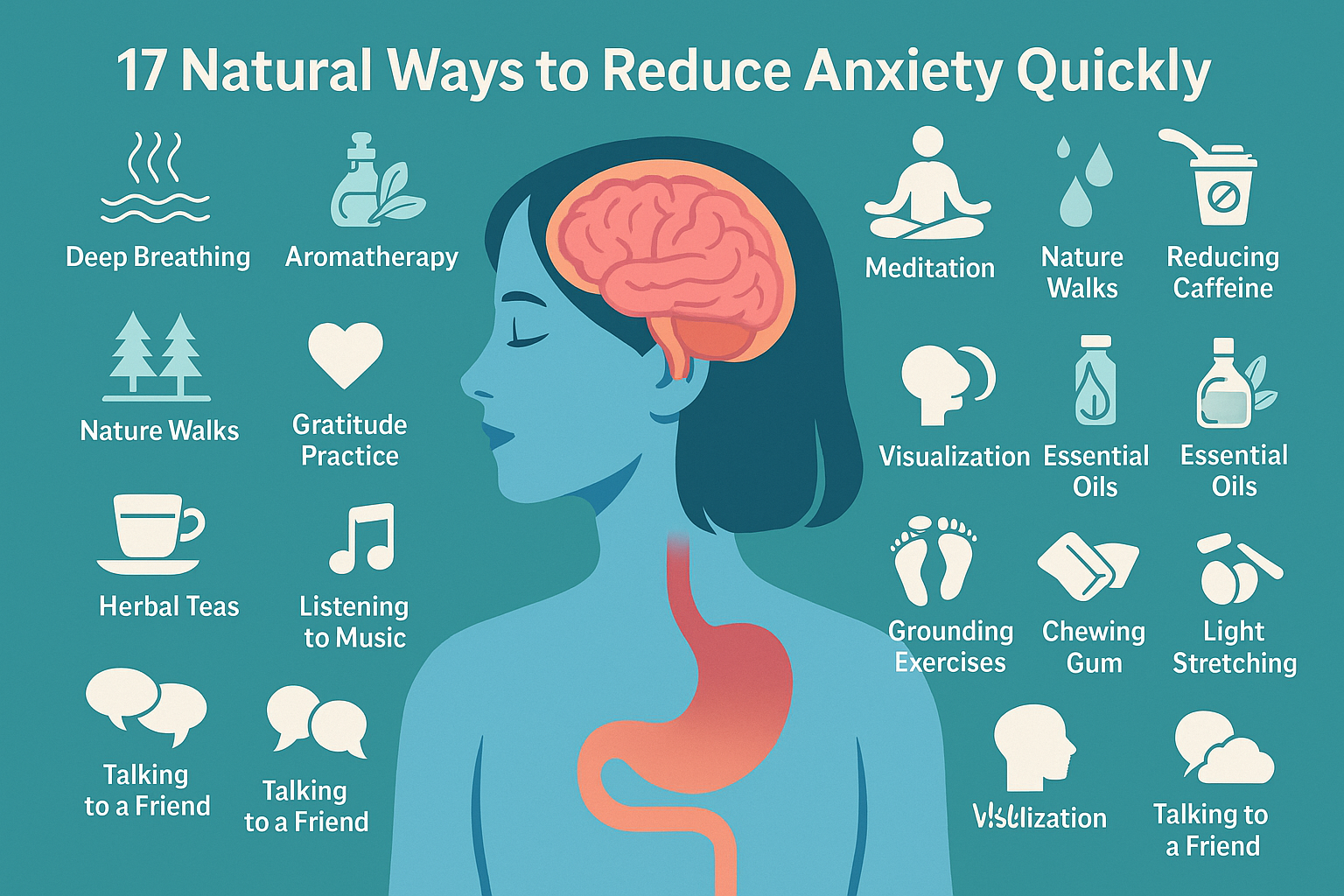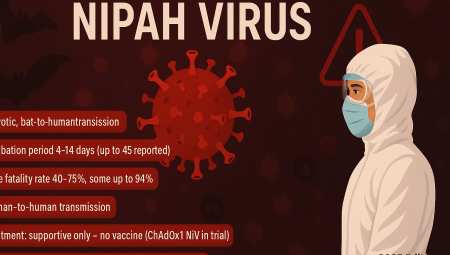Understanding Anxiety
Anxiety is more than just occasional worry. It’s a persistent sense of fear or dread that can interfere with daily activities. There are several forms of anxiety disorders, including:
-
Generalized Anxiety Disorder (GAD)
-
Panic Disorder
-
Social Anxiety
-
Phobias
Symptoms range from rapid heartbeat and shortness of breath to irritability and trouble sleeping.
Why Natural Methods Matter
Natural anxiety relief methods offer several advantages:
-
Fewer side effects compared to medication
-
Promotes long-term resilience and self-awareness
-
Can be integrated easily into daily routines
However, these approaches aren’t meant to replace professional help when symptoms are severe or chronic.
17 Natural Ways to Reduce Anxiety Quickly
Let’s explore science-backed, fast-acting techniques to calm your nerves:
-
Deep Breathing
Slow, intentional breathing lowers cortisol and activates your parasympathetic nervous system. -
Aromatherapy
Lavender, chamomile, and bergamot essential oils can calm the mind. -
Herbal Teas
Chamomile, lemon balm, and valerian root teas have mild sedative effects. -
Meditation
Just 5–10 minutes of mindfulness can decrease anxiety levels. -
Nature Walks
Being in green spaces reduces anxiety hormones and boosts mood. -
Cold Water Splashing
Activates the vagus nerve, promoting relaxation. -
Journaling
Writing down worries helps unload mental clutter. -
Gratitude Practice
Focusing on what’s good shifts the mind away from fear. -
Reducing Caffeine
Too much coffee can spike anxiety—opt for herbal alternatives. -
Listening to Music
Soft instrumental or nature sounds calm brain activity. -
Magnesium-Rich Foods
Almonds, spinach, and dark chocolate support nervous system balance. -
Essential Oils
Inhaling or diffusing calming scents can lower anxiety fast. -
Grounding Exercises
Touching the earth, barefoot walking, or tactile activities bring focus back to the body. -
Chewing Gum
Increases blood flow to the brain and can distract from anxious thoughts. -
Light Stretching
Relieves muscle tension and releases calming endorphins. -
Visualization
Picture a calming scene—beach, forest, or peaceful memory. -
Talking to a Friend
Social connection releases oxytocin, the “calm hormone.”The Science Behind These Methods
Each of the 17 techniques listed is supported by research or physiological understanding:
-
Deep breathing and meditation: Shown to decrease cortisol and activate the parasympathetic nervous system (the body’s natural “calm down” switch).
-
Aromatherapy and essential oils: Lavender oil, in particular, has been clinically proven to reduce anxiety in pre-operative patients and people with generalized anxiety.
-
Nature exposure and grounding: Studies show that spending time in nature lowers blood pressure and anxiety hormones like adrenaline.
-
Magnesium and nutrition: Magnesium plays a critical role in neurotransmitter function and mood regulation.
These aren’t just folk remedies—they’re grounded in neurobiology and stress physiology.
Foods That Help Ease Anxiety
What you eat affects your mind more than you think. Consider these calming foods:
-
Fatty fish: Rich in omega-3s, which regulate neurotransmitters like serotonin.
-
Dark chocolate: Contains flavonoids and magnesium to ease tension.
-
Yogurt and kefir: Gut health is linked directly to mental health via the gut-brain axis.
-
Oats: Provide slow-releasing energy and help stabilize blood sugar (anxiety spikes with crashes).
-
Blueberries: High in antioxidants that combat oxidative stress linked to anxiety.
A balanced, whole-foods-based diet is crucial for long-term mental wellness.
Supplements for Natural Anxiety Relief
When food alone isn’t enough, certain supplements may provide extra support:
-
Magnesium: Often deficient in people with chronic stress.
-
L-theanine: Found in green tea, promotes calm without sedation.
-
Ashwagandha: An adaptogenic herb that lowers cortisol and improves mood stability.
-
Vitamin D: A deficiency is associated with increased anxiety levels.
-
Omega-3s: EPA and DHA support brain health and reduce anxiety symptoms.
Always consult a healthcare provider before starting any new supplement regimen.
Anxiety Triggers to Avoid
Reducing anxiety isn’t only about what you do—it’s also about what you don’t do.
-
Social media overuse: Can increase feelings of inadequacy and stress.
-
Poor sleep: Lack of rest amplifies emotional sensitivity and lowers stress tolerance.
-
Caffeine and sugar: Both can cause energy crashes, mood swings, and heightened anxiety.
Being mindful of these triggers can prevent anxiety before it starts.
When to Seek Professional Help
While natural remedies can work wonders, they’re not a substitute for medical care when:
-
Anxiety interferes with daily functioning
-
Panic attacks become frequent
-
Sleep is disrupted regularly
-
You experience prolonged sadness or isolation
A therapist or psychiatrist can help tailor a treatment plan combining therapy, lifestyle, and (if necessary) medication.
FAQs About Natural Anxiety Relief
Q1: How fast do natural methods work?
Some (like deep breathing) offer relief in minutes, while others (like diet changes) may take days or weeks.Q2: Are essential oils safe?
Yes, when used as directed. Always dilute if applying topically and avoid ingesting unless under professional guidance.Q3: Can exercise reduce anxiety?
Absolutely. Even 15–30 minutes of light movement can boost mood and reduce stress hormones.Q4: What time of day is best for meditation?
Morning sets a calm tone, while evening helps release the day’s tension—both are effective.Q5: Can anxiety be “cured” naturally?
It can be managed and reduced, especially when triggers are understood and long-term habits are formed.
Conclusion: Calm Is Possible Without Pills
Anxiety may feel overwhelming—but you have more control than you realize. With the right tools, mindset, and lifestyle, you can quiet the mental storm without relying solely on medication.
From breathing techniques to a calming meal, every step you take toward natural self-care is a step toward peace of mind.
🔗 External Resource: For evidence-based mental health advice, visit Anxiety & Depression Association of America (ADAA).
-



